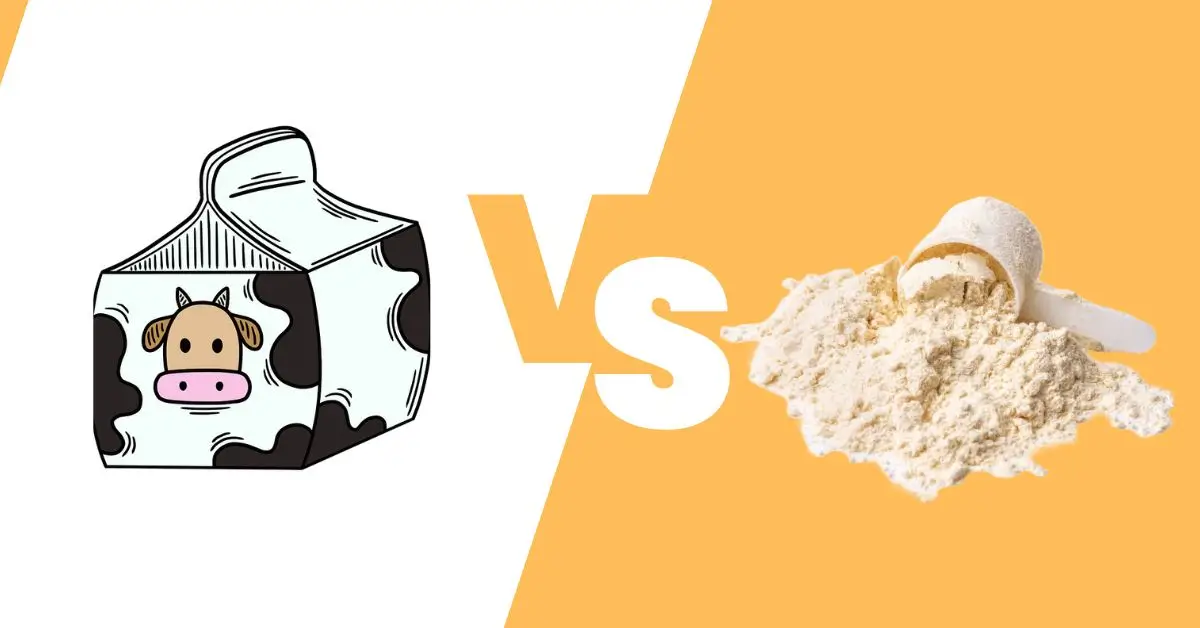Can Milk Replace Protein Powder?
The answer is a definite no. Each food has its unique value. Let’s first look at the nutritional composition of milk. There are several types of milk: regular whole milk, low-fat milk, and skim milk. Whole milk contains roughly 3.5 grams of protein and around 3.8 grams of fat per 100 milliliters. These values can fluctuate because it’s whole milk. Low-fat milk reduces the fat content found in whole milk. The fat from whole milk is extracted to make butter, and what remains is low-fat milk. As a result, low-fat milk is relatively cheaper, but it also has a less appealing taste due to the lower fat content.
Now, let’s discuss protein powder. We mentioned earlier that whole milk contains about 3.5 grams of protein per 100 milliliters. Approximately 80% of this protein is casein, and about 20% is whey protein. Casein is absorbed slowly and has lower absorption efficiency, while whey protein is absorbed quickly and efficiently, making it ideal for post-workout and early morning protein supplementation. However, whole milk contains only 0.7 grams of whey protein per 100 milliliters. Additionally, the presence of significant amounts of fat and casein in whole milk slows down its absorption rate compared to whey protein, making it unsuitable for immediate post-workout consumption.
Protein powder, on the other hand, has a high protein content, typically around 70-80%. A single 30-gram scoop of protein powder can contain over 20 grams of protein, most of which is whey protein, ensuring rapid absorption and high efficiency. To obtain the same amount of protein from whole milk, you would need to consume over 600 milliliters at once. Therefore, milk cannot match protein powder in terms of protein content, absorption speed, or efficiency. Protein powder allows for less fat intake while providing quick and efficient protein supplementation, which is its main advantage.
However, it’s crucial to remember that protein powder cannot replace regular meals. Our daily diet should consist of rice, lean meat, and vegetables, which are the true building blocks of our bodies. Additionally, eggs, fish, shrimp, and even tofu are excellent sources of protein. Protein powder is beneficial for quick absorption, particularly post-workout, upon waking, or when dietary protein intake is insufficient.
To summarize, can milk replace protein powder? The answer is no.
Can You Drink Milk During a Fat Loss Phase?
We’ve already analyzed the nutritional content of milk. The key to fat loss is your daily total caloric intake. If your total intake is less than your total expenditure, you will lose fat. For fitness enthusiasts, it’s important to maintain a certain level of protein intake during a calorie deficit to preserve muscle mass. Additionally, complex carbohydrates, such as rice, sweet potatoes, pasta, and baguettes, are essential for fueling workouts. Therefore, during a fat loss phase, it’s crucial to eat more precisely.
While whole milk does provide some protein, it also adds fat to your diet. If this fat intake affects your daily fat allowance, you’re consuming too much. It ultimately comes down to quantity. If you want to enjoy a bit of whole milk during a fat loss phase and can control your caloric intake, then drinking 50 milliliters a day just for the taste isn’t a problem. However, if you’re already struggling to control your caloric intake and consume large amounts of whole milk daily, you might enjoy the taste but hinder your fat loss progress.
In conclusion, it is possible to drink milk during a fat loss phase as long as you control your caloric intake and consume it in moderation. However, during my fat loss phases, I avoid whole milk because I prefer to prioritize protein and complex carbohydrates while maintaining a calorie deficit, despite knowing that whole milk tastes better.
Summary
Milk cannot replace protein powder due to differences in protein content, absorption rates, and efficiency. During a fat loss phase, moderate milk consumption is acceptable if you manage your caloric intake well, but prioritizing protein and complex carbohydrates is advisable.


